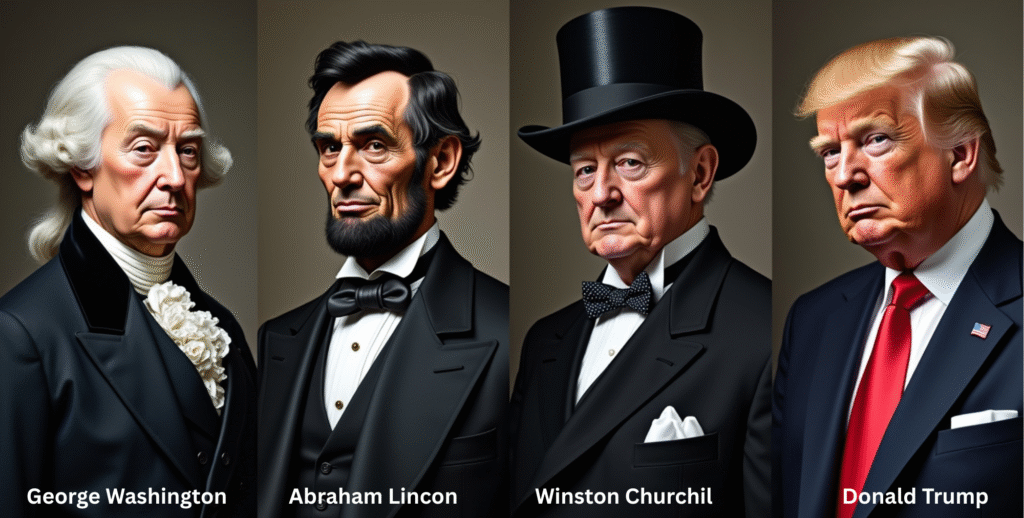From Wooden Teeth to Nuclear Tweets: How Dentures Helped Lead the World into War and Peace
Dr. Bibhakar Ranjan, Health Desk – Martian Smiles Lab
New Delhi, UPDATED June 23, 2025 10:51 PM

History often remembers the booming voices of its most famous leaders who wore dentures. Commanding, resolute, unwavering—these voices declared war, called for peace, and shaped the destiny of nations. But few pause to ask: what made those voices possible?
Beneath the stirring speeches and televised addresses lies an unexpected commonality—dentures. Yes, prosthetic teeth. From the ivory dental work of George Washington to speculation around Donald Trump’s enunciation, the artificial jaw has played a quiet but critical role in world affairs.
This is the hidden oral history of global leadership—a journey where the strength to speak was sometimes crafted in porcelain and gold. Because when mouths fail, empires don’t wait
George Washington: The Revolutionary Grimace
George Washington's false teeth were not wooden, as you may have heard. They were actually made from a variety of materials, including human teeth. According to the accounting record in Mount Vernon's Ledger Book B, the teeth may have been pulled from Washington's slaves. Later… pic.twitter.com/J0iQYxhJbC
— Historic Vids (@historyinmemes) August 2, 2023
America’s founding father is remembered for his towering integrity and steely resolve—but behind his famously tight-lipped portraits was a mouth in constant agony. Contrary to popular belief, George Washington’s dentures were never made of wood. Instead, they were an unsettling mix of carved ivory, animal bone, and even teeth purchased from enslaved people—a grim reflection of the contradictions of his time.
By his inauguration in 1789, Washington had only one natural tooth left, which he eventually entrusted to his dentist, Dr. John Greenwood, who mounted it into a gold wire denture. Despite the best materials available, the prosthetics were painfully ill-fitting. They pushed his lips into an unnatural pout and made speaking difficult, contributing to his often somber expression and abbreviated public addresses.
He regularly wrote about his dental distress in personal letters, once even blaming jaw pain for cutting a state dinner short. His dentist would send specialized cleaning tools and wax for adjustments, but the discomfort persisted for life.
Abraham Lincoln: Ivory Truth in the Civil War
#OTD - November 19, 1863 - President Abraham Lincoln delivered remarks, which later became known as the Gettysburg Address, at the dedication of the Gettysburg National Cemetery.
— National History Day (@NationalHistory) November 19, 2023
Image: Library of Congress pic.twitter.com/MAEjKU9fuB
Abraham Lincoln, one of the famous leaders who wore dentures feared dentists more than bullets. After a famously traumatic tooth extraction—performed by a barber with pliers and no anesthesia—he developed a deep mistrust of dental procedures. For the rest of his life, he avoided professional treatment whenever possible, even as his dental health deteriorated.
Lincoln is believed to have worn partial dentures, likely crafted from gold and walrus ivory, which he adjusted himself on occasion. His distinctive, slightly off-center smile and his tightly drawn cheeks may have been the result of these prosthetics—not just genetics. Despite the discomfort, his oratory remained unaffected. With unwavering calm, he delivered the Gettysburg Address in under three minutes, shaping the moral framework of the nation with what may have been a mouth half-filled with makeshift teeth.
It was said he sometimes carried dental tools with him, preferring to tend to his own teeth rather than trust another man with his jaw. His was a voice that had every reason to falter—scarred by grief, war, and decay—but it never did.
Winston Churchill: The Voice That Bit Back
Winston Churchill's dentures sold at auction in the UK
— NEXTA (@nexta_tv) February 7, 2024
It was sold for $22.7 thousand. Churchill used it during his famous "We shall fight on the beaches" speech. pic.twitter.com/g0AgsNQ6VM
The British Bulldog of WWII didn’t just wield words—he carefully engineered his ability to speak them. Churchill wore a custom-made upper denture designed specifically to preserve his unmistakable lisp and gravelly cadence. His dental team understood that his voice was a national weapon, and chief among them was Sir Wilfred Fish, later knighted for his contributions to the war effort—through dentistry.
Churchill’s dentures were not simply prosthetics—they were instruments of morale. His war speeches, delivered with rhythmic precision and deliberate pauses, reverberated through bombed streets and bunkers: “We shall fight on the beaches…” These words weren’t just spoken—they were fortified by dental craftsmanship.
So protective was Churchill of his voice that he famously carried a spare set of dentures wherever he went, fearing the disaster of losing his ability to speak in the middle of a national crisis. It’s even said that when one of his cherished sets was accidentally broken, he demanded it be repaired—not discarded—because it was “part of him.”
For Churchill, teeth were not just for chewing—they were part of his arsenal. Without them, his war cry might have been reduced to a whisper.
Donald J. Trump: The Unconfirmed Denture, The Undeniable Voice
In 2017, following a televised speech about Jerusalem that ended with a noticeable slur, social media erupted with speculation about ill-fitting dentures. Comedian Trevor Noah famously dubbed the moment “#DenturedDonald,” fueling a wave of rumors about the former president’s dental health.
While Trump has never publicly addressed these claims, many speech analysts have observed his exaggerated mouth movements and carefully measured enunciation—possibly adaptations to dental prosthetics. His precise articulation, often coupled with a famously rigid facial expression, has long drawn attention from both supporters and critics.
Regardless of whether the speculation holds, Trump’s mastery of image, projection, and dominance is unmistakable—traits central to his political brand. His ability to control the narrative, whether through campaign rallies or televised military declarations, echoes the legacy of past leaders who understood that voice is power.
His recent statement on the Iran conflict, delivered with unshakable confidence, reinforces the strange paradox: a leader whose voice may—perhaps literally—be supported by artificial teeth, yet whose words carry very real consequences for the world.
Why Dentures Matter
Dentures are not just medical tools. They are silent partners in the projection of power:
- They preserve voice when nature deteriorates.
- They stabilize identity when faces age.
- They enable performance, even when pain prevails.
In war, confidence matters. And in speech, clarity convinces. Leaders with artificial jaws have moved millions—because the strength to speak clearly, despite decay, is the strength to lead.
In fact, studies show that speech clarity and jaw control significantly influence audience trust and emotional response. A 2019 study from the University of Leeds found that even a minor slur in pronunciation can reduce perceived authority by 22%. In high-stakes diplomacy, every syllable counts.
The Mouth as a Mirror of History
The next time you hear a rousing call to action, ask yourself: whose voice is it? And what holds it together?
Perhaps the most surprising lesson is this: even famous leaders who wore dentures could bite into history and speak resilience into the future.
Official Address
- Bonn, Germany
- Victoria, Mahe Island, Seychelles
- New Delhi, India.
- info@drbibhakarranjan.com
- +49 15560 936114
Copyright 2025 Dr Bibhakar Ranjan – All Rights Reserved
